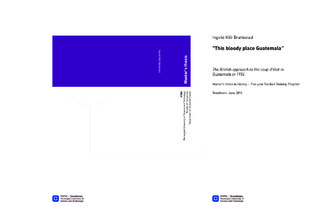| dc.description.abstract | On the 19th of June 1954, the UN received a formal complaint from the Guatemalan Minister of External Affairs, Guillermo Toriello, stating that foreign powers were undertaking a military invasion in their territory. The US, under the Eisenhower administration, had planned to support a military invasion by Carlos Castillo Armas, with the purpose of ousting The democratically elected president Jacobo Arbenz Guzman. The invasion was successful and the more American-friendly Castillo Armas took power. What followed was decades of dictatorships and a 36-year long civil war that finally ended in 1996. The coup had not been possible had it not been for the support of the US. The US received no sanctions from the UN or from any other organizations, despite the fact that the case ended up in discussion in the UN Security Council.
The UN Security Council process became a political dilemma for Great Britain. The Eisenhower administration expected full support in the Council from their European ally. The Churchill government had a diplomatic goal of maintaining and strengthening the “special” Anglo-American relationship. Great Britain was forced to balance the value of the “special relationship” with the damaging consequences of supporting the US in their efforts to hide their involvement. | nb_NO |
